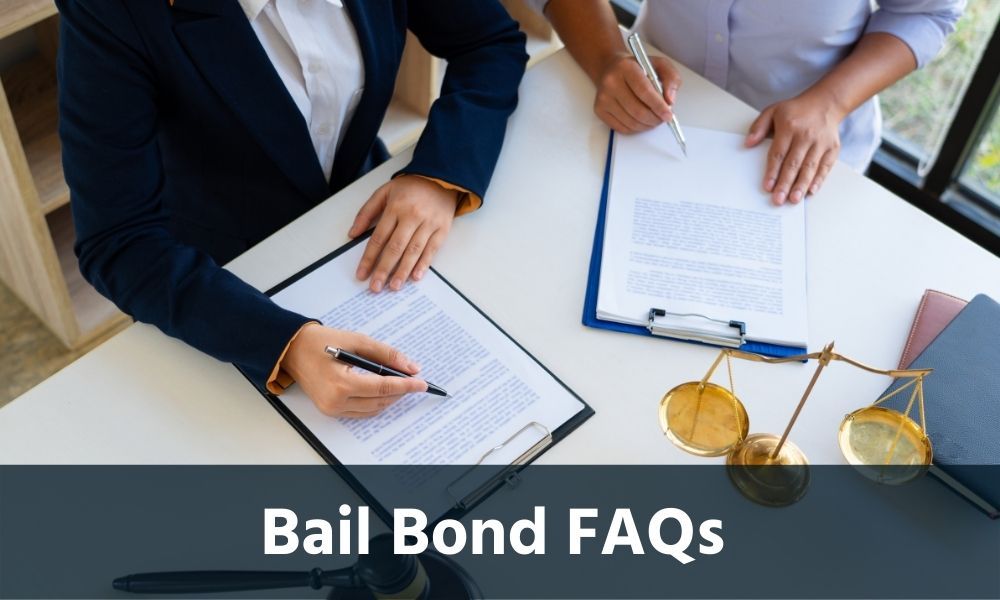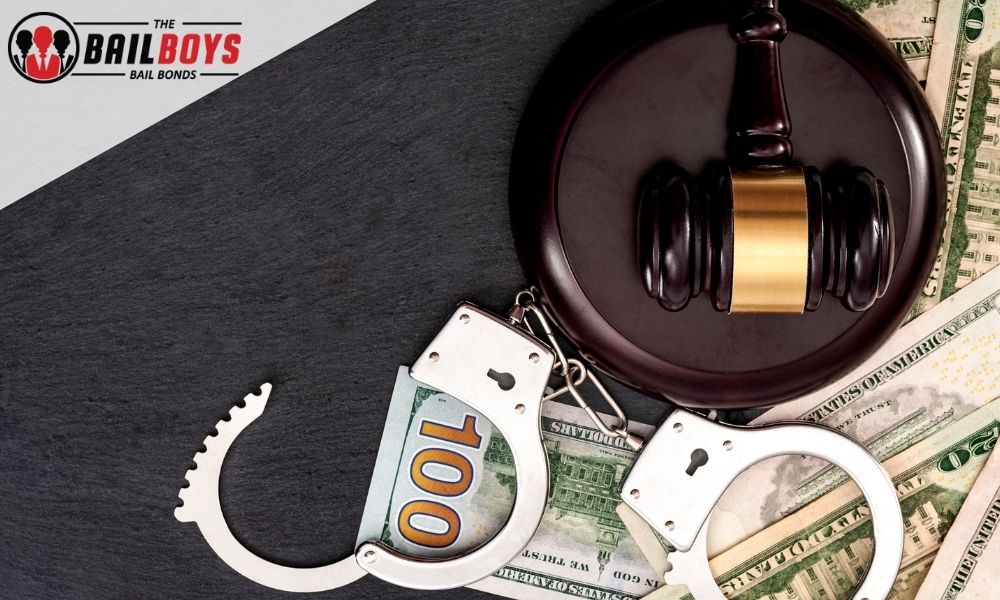
The Difference Between Bail vs Bond
Understanding the difference between bail vs. bond is crucial when you find yourself dealing with legal matters. Although these terms are often used interchangeably, they have different meanings. This guide will explain everything to know about the difference between bail and bond, making it easier to navigate the legal system.
If you need help bailing someone out of jail, please contact The Bail Boys for the most affordable and reputable bail bond option in California: (800) 798-7366. One of our experienced bail bonds agents will be here for you.

Why You Might Need to Pay Bail or Get a Bond
When someone is arrested, they often face the possibility of remaining in custody until their court date. To avoid this, the court may set a financial amount that needs to be paid to secure their temporary release—this is where understanding bail vs. bond becomes essential. Bail is cash, property, or a bond paid to the court to ensure the arrestee appears at all required court dates. If the arrestee cannot afford the bail amount on their own, they have the option to secure a bond through a bail bond service, which acts as a guarantee to the court for the full bail amount.
The choice between posting bail directly or securing a bond through a bail bondsman depends largely on financial capability and personal circumstances. Let’s take a closer look at the differences of bond vs. bail, and why and how these options are utilized to facilitate release from custody.
What is Bail?
Bail is a sum of money that a defendant pays to the court in order to be released from jail while awaiting trial. Bail serves as a guarantee that the defendant will show up for all of their court appearances. If the defendant fails to show up for court, the bail money is forfeited.
How Does Bail Work?
The bail process typically starts with the defendant’s arraignment, where the charges against them are read and they enter a plea. The judge will then set bail based on several factors, including the severity of the charges, the defendant’s criminal history, and their likelihood of fleeing.
If the defendant can afford the bail amount, they can pay it directly to the court, and they will be released from custody. If they cannot afford bail, they may seek the assistance of a bail bondsman. Some bondsman, such as The Bail Boys, offer online bail bond services for quick and easy assistance.
Requirements and Conditions for Bail
Bail is not automatically granted to everyone who is arrested. Certain requirements and conditions must be met for bail to be considered as an option.
Primarily, the court assesses the severity of the alleged crime, the individual’s criminal history, potential flight risk, and the likelihood of reoffending while on bail. Additionally, the court may impose specific conditions on the release, such as travel restrictions, regular check-ins, or substance abuse counseling, to ensure the individual remains compliant with the law and returns for court dates.
Understanding these prerequisites is crucial for navigating the bail process effectively.
Types of Bail
There are several types of bail that a defendant may be required to post.
- Cash bail: the defendant pays the full bail amount in cash directly to the court.
- Property bond: the defendant uses property, such as a house or car, as collateral for the bail amount.
- Personal recognizance: the defendant is released without bail on the promise that they will appear in court.
- Surety bond: the defendant hires a bail bondsman, who posts the bail amount in exchange for a fee.
What is the Difference Between Bail and No Bail?
In California, recent changes in bail laws have introduced “no bail” scenarios for certain minor offenses. This reform aims to make the legal system more equitable by allowing individuals accused of low-level crimes to be released without financial conditions.
The difference between bail and no bail hinges on the nature of the crime and the assessment of the individual’s risk to the community. Under no bail, individuals can leave custody without posting bail, based solely on their promise to appear in court, thereby eliminating economic disparities in the pretrial release process. This shift reflects a major change in the justice system, focusing on fairness and rehabilitation.
Advantages and Disadvantages of Bail
One advantage of bail is that it allows defendants to be released from custody while awaiting trial, which can be important for their job, family, and personal life. However, bail can also be expensive, and if the defendant cannot afford it, they may be stuck in jail until their trial.
What is a Bond?
A bond, also known as a surety bond, is a contract between the defendant, a bonding company, and the court. The bond serves as a guarantee that the defendant will show up for all of their court appearances.
How Does a Bond Work?
The bail bonds process can be a complex one, but here is a basic break down of how bail bonds work. If the defendant cannot afford bail, they may seek the assistance of a bail bondsman. The bondsman charges a non-refundable fee, typically 10% of the bail amount, and posts a bond with the court for the full bail amount. Some bonding companies such as The Bail Boys, offer other options such as no-money down bail bonds.
The bondsman is responsible for ensuring that the defendant appears in court for all of their scheduled appearances. If the defendant fails to show up for court, the bondsman may hire a bounty hunter to locate and return the defendant to custody.
Types of Bonds
There are several types of bonds that a defendant may be required to post.
- Cash bond: the defendant pays the full bail amount directly to the bondsman.
- Property bond: the defendant uses property, such as a house or car, as collateral for the bond.
- Immigration bond: used for non-citizens who are detained by immigration authorities.
- Federal bond: used for federal crimes.

Advantages and Disadvantages of Bonds
One advantage of bonds is that they can be a more affordable option for defendants who cannot afford bail. However, the non-refundable fee charged by the bondsman can still be expensive, and if the defendant fails to appear in court, they may be subject to additional penalties and fees.
What is the Difference Between Bond and Bail?
The main difference between bail and bond is who pays the money. With bail, the defendant or their family pays the full bail amount to the court, and the money is refunded at the end of the case as long as the defendant appears in court. With a bond, the defendant pays a non-refundable fee to a bondsman, who then posts a bond with the court.
Another difference is the role of the bondsman. With bail, there is no middleman involved. With a bond, the defendant works with a bondsman, who assumes the risk if the defendant fails to appear in court.
Bail vs Bond: Which is Right for You?
Whether bail or bond is right for you will depend on your individual circumstances. If you can afford to pay the full bail amount, bail may be the better option. However, if you cannot afford bail, a bond may be the only way to get out of jail.
It’s important to remember that both bail and bond come with their own set of risks and drawbacks, and you should carefully consider your options before making a decision.

Bond vs Bail FAQs
Can I get my bail or bond money back if I’m found not guilty?
Yes, as long as you appeared in court for all of your scheduled appearances. Learn more here.
Can I negotiate the bail or bond amount?
No, the judge sets the bail or bond amount based on several factors, and it cannot be negotiated.
What happens if I fail to appear in court while on bail or bond?
If you fail to appear in court, the bail or bond may be forfeited, and a warrant may be issued for your arrest.
Can I use a bond if I’m charged with a federal crime?
Yes, you can use a federal bond if you’re charged with a federal crime.
Do I need a lawyer to post bail or bond?
No, you do not need a lawyer to post bail or bond, but it’s recommended that you consult with a criminal defense attorney to understand your rights and options.
How Can a Bail Bonds Company Help?
A bail/bond company exists to help people who cannot pay bail avoid spending time in jail. If a person does not have funds available, the bonding company takes legal responsibility for their actions to get them out of jail via a bail bondsman.
Many bail/bond companies have a set fee that the person must pay before they assume this responsibility, but it is usually more affordable than bail- and much better than jail. A bail/bond company is often the only option for defendants who do not have money available to them.
Recapping the Differences Between Bail vs. Bond
Knowing the distinctions between bail and bond is important for anyone navigating the pretrial release process. While bail involves paying a set amount directly to the court, a bond is secured through a bail bonds service that guarantees the amount on your behalf. Both options aim to ensure the defendant’s appearance in court while allowing them freedom during the trial period.
For expert guidance on your bail options in California, The Bail Boys are here to help. We offer comprehensive bail bonds services and are available 24/7 to answer your questions and assist with your bail needs. Reach out today for immediate support!


